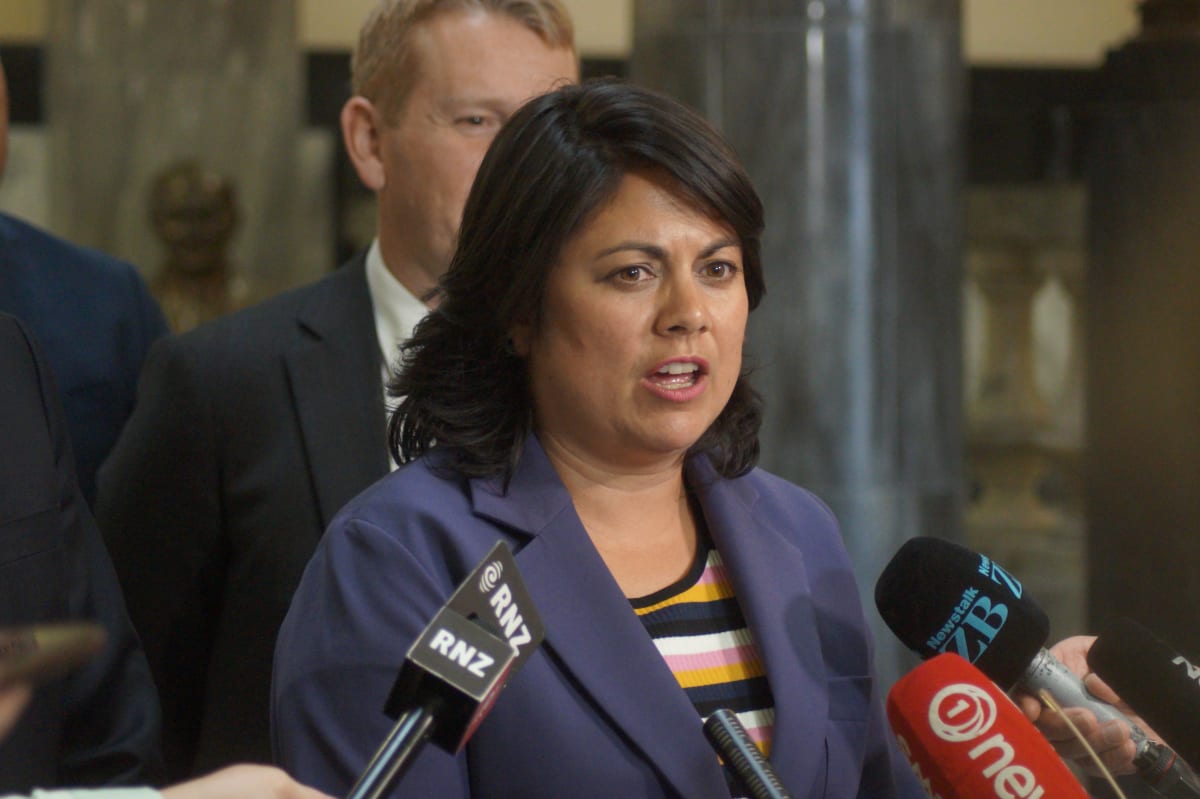
Pharmacies calling for scrapping prescription charges may in fact benefit. David Williams reports.
Even the researchers were surprised.
In February, the results of a new study into a $5 charge for prescriptions were released.
“It was really dramatic,” said the lead researcher, Professor Pauline Norris, of the University of Otago’s Va’a o Tautai – Centre for Pacific Health.
The study, published in the journal BMC Health Services Research, found for every 100 people who received free prescriptions, 33 were admitted to hospital and stayed for 208 days. Those numbers shifted substantially for those who still had to pay the $5 charge: for every 100 people, 41 were admitted to hospital and stayed for 326 days.
READ MORE: * Budget 2023: No ‘major’ new taxes but $80b more tax revenue * Budget 2023: ECE expansion, prescription changes in ‘pragmatic’ plan
Norris and her team made the realistic recommendation the charges be scrapped for people with high health needs and low incomes. Or, they added, they could be dropped entirely.
The $5 charge per medicine, dubbed a co-payment, is an insurmountable barrier for some, Norris argued. Health surveys revealed Māori and Pacific peoples, and the highly deprived, were the worst-affected.
“They go without their medicines, and as a result their health problems get worse, so they need hospital care,” said Norris.
“This is bad for them, their whānau, and the health system.”
Study co-author Dr Shirley Keown, of Turanga Health, said: “Prescription charges force people to choose between getting their medicines, feeding their whānau, paying the power bill or buying petrol for the car to get to work.”
No longer.
From July 1, the Government announced in yesterday’s Budget, the $5 charge will be scrapped. That’ll help about three million people.

The co-payment has been a target for years.
The 2019 Budget’s headline announcement was a $1.9 billion, five-year package for mental health. While pleased, Pharmacy Guild chief executive Andrew Gaudin said: “We believe that providing better patient access would be a key step to addressing access and equity issues caused by patient co-payments for prescription medicines.”
This year, the pressure has built.
Norris’ research was released in February.
The following month, a position paper by the Independent Community Pharmacy Group (ICPG) said 137,000 adults didn’t get at least one prescription because of the cost in 2021/22. (This research was mentioned by Health Minister Ayesha Verrall yesterday.)
On May 1, ICPG teamed up with a newly-formed group called Prescription Access Initiative to release a survey of pharmacists who dropped prescription fees after Cyclone Gabrielle.
Initiative spokeswoman Vicky Chan, a Pakuranga pharmacist, said in a press statement: “The Government prescription fee is causing widespread distress in our communities, and it needs to be removed immediately.”
On Tuesday of this week, Prescription Access Initiative said scrapping the charge was “the obvious thing to do” in the Budget.
Yesterday’s announcement suggests the pressure worked.
“What it will do is let people see that when they take medication it’s effective.” – Sam Murton
Norris’ research provides evidence the $5 charge leads to tangible harm. But it’d be neglectful not to also mention the financial harm it has been doing to some pharmacies.
Many of them, especially small independents, have been struggling because of increased competition from cut-price chains that dropped the $5 co-payment as a business strategy.
“They’ve taken advantage of a government tax and they’ve used medicines as a loss leader to sell products,” Pharmaceutical Society president Professor Rhiannon Braund told BusinessDesk last year.
Removing the $5 charge may well level that playing field. (But the win might be short-lived given the National Party promised, if they win this year’s election, to bring it back.)
Braund, who was “buzzing” at the announcement, told Newsroom yesterday: “Some of the smaller independents just couldn’t compete with the buying power of those big boxes, so it [removing the $5 charge for prescriptions] absolutely makes a real difference to a lot of our community pharmacies, particularly in areas that are under-served anyway.”
Reaction to the Budget release is mixed.
Grey Power national vice president Pete Matcham, of Lower Hutt, says scrapping the $5 fee is excellent.
“A lot of older people are just living on the pension and, in particular, those who are also in rental accommodation have trouble making ends meet.
“Things like the prescription charge, even just a $5 co-payment, is a disincentive to seek out medical help.
“Obviously, both from an individual's point of view and from society's point of view, it makes far more sense for people to get as early treatment as possible to minimise the overall cost. So anything that removes barriers to go to see your GP is very welcome.”
Dr Samantha Murton, president of the Royal New Zealand College of General Practitioners, says many people with high health needs might have four or five prescriptions, increasing costs.
“All of us [GPs] would have conversations with people about, can you afford to pick up this prescription and, if not, how can we make that affordable for you? The fact that the Government is stepping in to [remove the charge] is fantastic.”
Braund, of the Pharmaceutical Society, is a professor at University of Otago’s New Zealand Pharmacovigilance Centre. She says many people are picking which medicine they can afford or not getting prescriptions at all.
“This is going to have a huge impact on health outcomes, particularly for our older people that are on multiple medicines, particularly for our vulnerable people, those that don’t have a lot of money and are making choices about where they spend their money, because sometimes food comes before medicine.”
This theme is picked up by Ian Hutson, director of Salvation Army’s social policy and parliamentary unit.
“A lot of people just forego [medicine] and get sicker.
“In the end, that hits our health services one way or the other, later on with much more serious stuff, if we can’t deal with it straight up at the beginning.”
Health Minister Verrall said yesterday removing the co-payment is estimated to cost $619 million over four years.
Interesting word that: 'cost'
Murton, of the Royal College of GPs, says the money is really an investment, at the “front end”, which will reduce the cost of hospitalisations.
“What it will do is let people see that when they take medication it’s effective. It allows GPs to be confident that what they’re giving, people will take.”
Widening the lens, Murton is heartened the Government is moving on the social determinants of health – something health professionals can’t influence.
“If people are living in warmer housing, if they are having better childcare, if family violence is being dealt with, if their mental wellbeing in schools is being looked after, if they’re getting lunches at schools – all those things make an enormous difference to people’s health and wellbeing at a prima facie level, but in the end we don’t end up dealing with other stuff down the track.”
Not everyone had such a rosy view of yesterday’s Government announcements.
Susan St John, an honorary associate professor in University of Auckland’s economics department and a founding member of the Child Poverty Action Group, gave this assessment to RNZ: “If we think about the thousands and thousands of families that the Auckland City Mission report at their doors unable to feed themselves, I don’t see anything in this Budget that is going to address the immediate poverty/hardship/food insecurity problems that families face every day.”
Child Poverty Action Group research, released this week, modelled the gap between what families receive on a core benefit and a basic standard of living.
For a single parent with three children, living in rented accommodation, the shortfall is $116 a week, rising to $250 for “total costs”. For a couple with two children, the weekly deficit is around $180, and $324, respectively.
Brooke Pao Stanley, of Auckland Action Against Poverty, told Newsroom no strides were made towards eliminating poverty. “It’s just a fake wellbeing Budget for the communities that we love and support.”
While dropping the $5 charge will help, some point out doctors' visits are still expensive – too expensive for some families.
Hutson, of the Salvation Army, says the Budget policies he saw yesterday were, without exception, reducing costs but not putting more money into the hands of the vulnerable.
Sure, he says, programmes that feed hungry kids in schools are good.
“In the end, I’d like to see that the people had adequate incomes, and they could feed themselves.”







